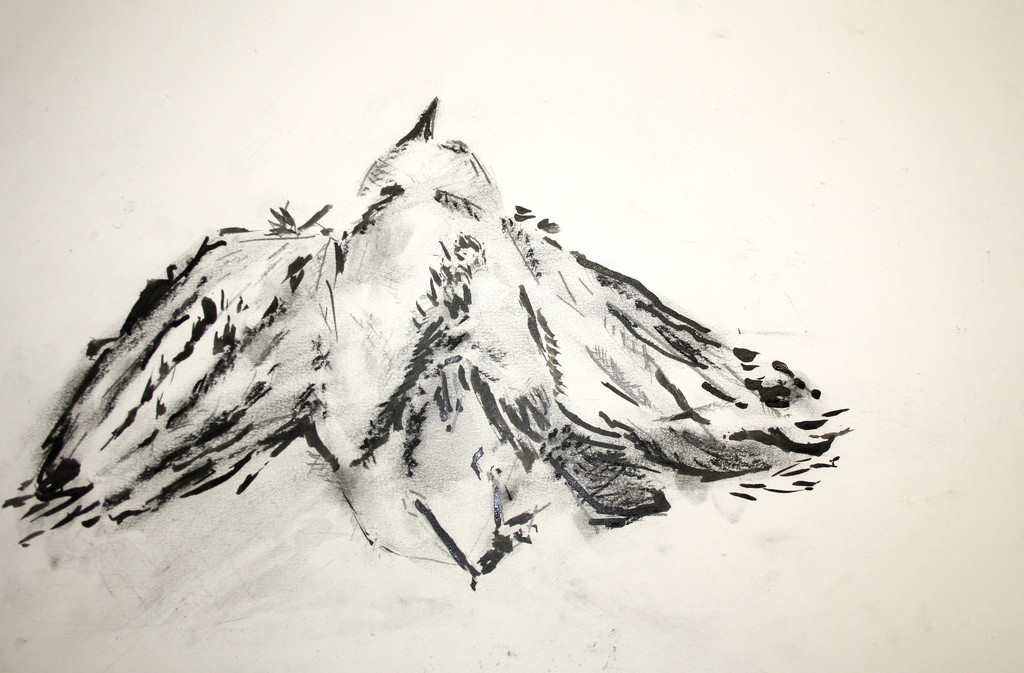Photo by Sophia.
I’ve been having an insightful shuffle through Mihaly Csikszentmihalyi’s book Creativity: The Work and Lives of 91 Eminent People. Mihaly is a seminal professor of Psychology and Management, and is the Founding Co-Director of the Quality of Life Research Center at Claremont. He writes:
“I have devoted 30 years of research to how creative people live and work, to make more understandable the mysterious process by which they come up with new ideas and new things. If I had to express in one word what makes their personalities different from others, it’s complexity. They show tendencies of thought and action that in most people are segregated. They contain contradictory extremes; instead of being an individual, each of them is a multitude.”
Nine out of the ten people in me strongly agree with that statement. As someone paid to be creative, I sometimes feel kaleidoscopic in my views or opinions, and that “multitude” of expressions sometimes confuses those around me. Why does that happen? My thoughts make cohesive sense to me, yet others sometimes feel that I am contradicting myself or switching positions. What is wrong with me?
Mihaly describes 9 contradictory traits that are frequently present in creative people:
01
Most creative people have a great deal of physical energy, but are often quiet and at rest. They can work long hours at great concentration.
02
Most creative people tend to be smart and naive at the same time. “It involves fluency, or the ability to generate a great quantity of ideas; flexibility, or the ability to switch from one perspective to another; and originality in picking unusual associations of ideas. These are the dimensions of thinking that most creativity tests measure, and that most creativity workshops try to enhance.”
03
Most creative people combine both playfulness and productivity, which can sometimes mean both responsibility and irresponsibility. “Despite the carefree air that many creative people affect, most of them work late into the night and persist when less driven individuals would not.” Usually this perseverance occurs at the expense of other responsibilities, or other people.
04
Most creative people alternate fluently between imagination and fantasy, and a rooted sense of reality. In both art and science, movement forward involves a leap of imagination, a leap into a world that is different from our present. Interestingly, this visionary imagination works in conjunction with a hyperawareness of reality. Attention to real details allows a creative person to imagine ways to improve them.
05
Most creative people tend to be both introverted and extroverted. Many people tend toward one extreme or the other, but highly creative people are a balance of both simultaneously.
06
Most creative people are genuinely humble and display a strong sense of pride at the same time.
07
Most creative people are both rebellious and conservative. “It is impossible to be creative without having first internalized an area of culture. So it’s difficult to see how a person can be creative without being both traditional and conservative and at the same time rebellious and iconoclastic.”
08
Most creative people are very passionate about their work, but remain extremely objective about it as well. They are able to admit when something they have made is not very good.
09
Most creative people’s openness and sensitivity exposes them to a large amount of suffering and pain, but joy and life in the midst of that suffering. “Perhaps the most important quality, the one that is most consistently present in all creative individuals, is the ability to enjoy the process of creation for its own sake. Without this trait, poets would give up striving for perfection and would write commercial jingles, economists would work for banks where they would earn at least twice as much as they do at universities, and physicists would stop doing basic research and join industrial laboratories where the conditions are better and the expectations more predictable.”
Sometimes what appears to be a contradiction on the surface is actually a harmony in disguise. My problem has been primarily one of communication. I am learning to let people know what I am thinking and why, and explaining myself in a way that helps them understand why I am discussing multiple perspectives instead of just cleanly stating my own. At first it might not make sense, but give me/us long enough, and it will.


I’m sorry but I did not like this. It describes creative people in both extremes on every subject which is not much of a revelation, rather it describes them with a horoscope-style vagueness which caters to self-adulation. I’d rather that creatives people humbly stated that they aren’t always comfortable trying different things, and they aren’t comfortable with rejection they receive for their ideas whether it be healthy criticism or not. And I;d rather they told them to not give up the fight and stay to the course that God has set before them.
so self-adulation is bad, but adulation of a fictional being and trying to force that ridiculous belief (I’m talking about “god” here) on other people is fine?
This post basically lifted pieces and parts from a 1996 article titled: The Creative Personality in Psychology Today written by Mihaly Csikszentmihalyi. It is important to note Csikszentmihalyi studied ’emiment’ creatives who changed their domain with their creative products/artifacts/ideas. This is a far cry from personal or everyday creativity which relates to the ‘rest of the people on earth.’ It is subjective. It you are interested in creativity – go to the source.
Hi Morta 🙂 I agree with you completely, and to add to it, I think only two things separate those eminent, ‘successful’ creatives from other, hyper creatives (which is essentially what the article is talking about). Opportunity and Circumstance.
If our culture was not so money-value driven, then we would see so much more creativity blooming! As it is, creatives only reach full flower when their skills line up with the market’s idea of value, combined with many opportunities along the way that are driven by sheer chance and circumstance (who your parents were, where you were raised, the many decisions you made in youth, etc). This is because we are all forced to sublimate our creativity to the needs of the society, which is currently driven by money, property and earning potential. If we are not earning dollars, our creativity almost doesn’t matter to that society. Van Gogh would have been considered a failed artist by today’s standards.. I mean, we could talk about a lot of the great masters in that context. Why were so many penniless during their lives? Why do we value creativity so little? It is because the system of earning is designed the way it is.
So, if allowed, many hyper creatives would flower out and produce beautiful things.. scientific discoveries, artworks, novels, and everything else you can imagine. But that can’t happen since they are chained to the system of production we currently have.
There are a lot more than ‘a few’ hyper creatives out there. Malcolm Gladwell posits that something like 1% or more of our population is composed of these types of people. He says that something like 15% of our population drives the other 85%, and within that 15% (the ‘creative class’) are sort of three types (Im not quoting here): Regular folks who are somewhat creative, True creatives, and hyper creatives. In my experience, he is pretty close to the mark.
I’ll be the first to say I don’t really know anything 🙂 But I think this has the kernel of truth to it, and I hope that more hyper creatives can come together and make some real magic happen.
Wow, do I see myself in this. I’ve had times where I’ve sat at my computer upwards of 10 hours straight either writing or coming up with something new, and since I’m self employed, it’s pretty quiet, to the point where often I can’t even turn on background music. Of course, at this stage I don’t feel that I always have the energy I initially had; that’s kind of a bummer…
Matthew, thank you for truly understanding me. What an amazing read.
After 23 years, does this mean I can finally come off of my meds?
Regardless, it really is a great article.
peace,
j-.
Max, thinking is an action. A unique thought, or revelation to one’s self, is implementation. Sometimes others can see it, too. Whether they agree or not is entirely a different matter.
I find this article to be very vague. Also, it doesn’t define what makes a creative person. And most of the self-centered people I know who consider themselves “creatives” will be using this article to justify their selfishness and eccentricities. “I’m special! I’m too much of a creative artist to do dishes!”
Yeah, either really into something or not at all. I always play stuff out in my head. If I’m not feeling it, trash it. Do I feel creative? Sometimes. I just have tunes in my head that need played to get it out . The joy of a self masterpiece is like finding water in the desert. Once you taste that water, you want more. Does it need to make since to you, heck no. It does by far make since to me. Do I need a article to tell me I’m creative, heck no. The beautiful tunes I put from a lead pencil to lined paper. Is sweet joy to my ears. Beauty to my eyes. Feeds my soul to be complete. Were all creative. It just depends on how motivated you are to get off that couch and put your tools your equipped with to work. Get to work.